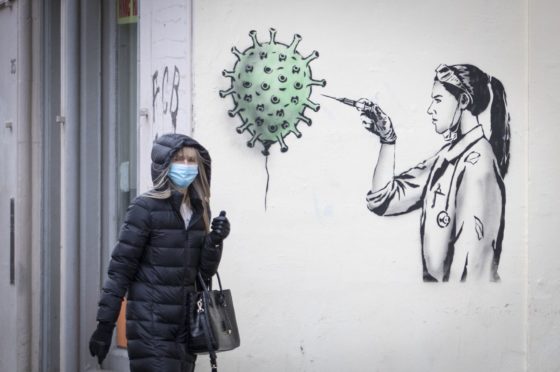Covid vaccines will be rolled out amongst 16 and 17 year-olds in Scotland, an update from the UK’s vaccine body has confirmed.
The change was confirmed in a press conference held at Downing Street with the Joint Committee on Vaccination and Immunisation (JCVI).
Prof Wei Shen Lim from JCVI confirmed the change in the guidance after a review by the vaccine body.
It will allow the Pfizer-BioNTech vaccine to be given to all those over 16.
Covid vaccine roll out confirmed for 16 and 17 year-olds in Scotland
Professor Wei Shen Lim, Covid-19 chair for the JCVI, said in a statement: “After carefully considering the latest data, we advise that healthy 16 to 17-year-olds are offered a first dose of Pfizer-BioNTech vaccine.
“Advice on when to offer the second vaccine dose will come later.
“While Covid-19 is typically mild or asymptomatic in most young people, it can be very unpleasant for some and for this particular age group, we expect one dose of the vaccine to provide good protection against severe illness and hospitalisation.”
Under previous guidance, coronavirus vaccines are available to some children aged 12 to 17 who have underlying health conditions.
After carefully considering the latest data, we advise that healthy 16 to 17-year-olds are offered a first dose of Pfizer-BioNTech vaccine.
But the new advice means the vaccination will be available to everyone aged 16 or over.
Speaking at the press conference about the Pfizer vaccine, Dr June Raine, of the MHRA, said safety was always the first concern.
“Most recently the results of randomised trials in children and young people aged 12-15 years were rigorously reviewed.
“In addition, we have data on neutralising antibodies that show how the immune system responds to the vaccine,” Dr Raine said.
She added that the data showed that the vaccine was as effective in adults, and the safety data demonstrated mild to moderate reactions similar to adults.
The conclusion has robustly been that the benefits outweigh the risks
“The conclusion has robustly been that the benefits outweigh the risks,” Dr Raine said.
Prof Wei Shen Lim said the JCVI’s main focus had been the balance of potential benefits and harms.
He said vaccination of children and young people can bring benefits for older people, but at the forefront was the benefits to children.
Prof Shen Lim said it was extremely rare for children to have a serious reaction, and also pointed to the risk of long Covid.
The advice for aged 12-15 year olds remain unchanged, and vaccination will be limited to those groups eligible currently.
Experts had previously stopped short of announcing the rollout previously, instead saying they were evaluating developing evidence.
Nicola Sturgeon said it was a “step forward she had been hoping for”.
“This is good news and a step forward that I’ve been hoping for. I also hope evidence will allow JCVI to recommend vaccine for wider groups of young people in future – but in meantime The Scottish Government will get on with offering it to all 16/17 yr olds ASAP.”
“We stand ready to implement any recommendations as soon as possible,” the First Minister said.
Scottish Government will roll out vaccines to over 16s ‘very swiftly’
Speaking on BBC Good Morning Scotland on Wednesday, Covid recovery minister John Swinney said the Scottish Government would take forward any new guidance ‘swiftly’.
Asked about the issue he told the programme: “We’ll take that forward really very swiftly to make sure we can make early progress on that and working on a four nations basis with vaccine supplies.
“We’ll make early progress on vaccinating 16-17-year-olds if that is the decision of the JCVI but the arrangements for face coverings in schools will be maintained as the first minister announced yesterday.”
Young people with cancer anxious about vaccine
Dr Louise Soanes, chief nurse at the Teenage Cancer Trust, acknowledged concerns around vaccines among young people fighting cancer.
But she said the latest news will ease some of that worry.
She said: “Young people with cancer have told us that they continue to feel apprehensive about Covid-19 and some continue to shield and take other precautions despite restrictions lifting.
The Joint Committee on Vaccination and Immunisation’s decision to offer 16 and 17-year-olds the Covid-19 vaccination will help reduce that apprehension.
“The expansion of the vaccination programme will protect their friends, family and others they come into contact with, but more crucially, it will also provide an additional layer of protection for the clinically vulnerable themselves.
“I encourage everyone who is eligible to get vaccinated so when they are ready, so clinically vulnerable people like those with cancer, can feel safe and begin to experience life again.”
